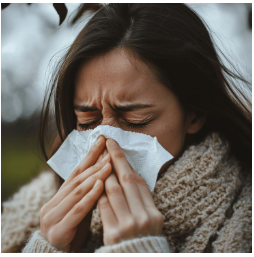Why Some People Get Sick More Often


Let’s be real. We’ve all known that one person who never seems to catch anything, flu season, stomach bug, even when everyone else in the office is coughing their lungs out, they’re fine. And then, there are those who get sick at the drop of a hat. You might even be one of them, the one person who cannot seem to escape sore throats, endless colds, or random infections that always pop up at the worst time during the day or season.
Why does this happen? Why do some people seem immune while others get hit over and over again? It’s not as simple as “luck” or “weak genes.” There’s actually a whole variety of reasons, some hidden, some obvious, that decide how often you’re reaching for tissues or antibiotics.
The Immune System’s Complicated Story
Here’s the thing. Your immune system isn’t just one thing, it’s a whole orchestra. You’ve got white blood cells, antibodies, the bone marrow making fresh soldiers, and even your gut bacteria playing a role in defending you. If one part of that orchestra is off-key, the whole song sounds wrong.
Some people are born with naturally strong immune defenses. Others, not so much. Conditions like hyperimmunoglobulinemia e syndrome (yeah, it’s a mouthful) can make people unusually prone to infections because their immune system overproduces certain antibodies but fails in other key defenses. Sounds weird, right? Too much of something that should be protective actually causes vulnerability.
But it’s not just rare genetic conditions. Everyday things chip away at immunity too—stress, poor diet, lack of sleep, environmental toxins, smoking, alcohol, and even loneliness. Yup, research shows loneliness literally weakens the immune response. Who would’ve thought?
Stress: The Invisible Immunity Killer
To be honest, stress is one of the most underestimated factors when it comes to why you might be getting sick more than your friends. Chronic stress floods your body with cortisol. At first, cortisol is supposed to help by suppressing inflammation, but when it’s always elevated, your immune cells just stop responding to it. They become numb. And then you’re wide open to every passing germ.
Think about college students during finals week, they always get sick right after exams. Or new parents running on two hours of sleep. That’s not a coincidence. That’s stress eating away at immune resilience.
The Microbiome Factor Nobody Talks About Enough

Interestingly, your gut bacteria are a huge part of the immunity story. Around 70% of your immune system sits in your gut. If you’ve been on antibiotics too often, or if you eat mostly processed food, your gut flora might be off balance. That can mean fewer “good” microbes to help you fight off the bad guys.
Ever heard of someone taking Iverhuman 12 mg? It’s a medication sometimes discussed in the context of parasitic infections. Parasites, like worms, can linger in the gut and absolutely mess with your immune system’s balance. When parasites are eliminated, not only do symptoms improve, but sometimes people even notice they get sick less often afterward. It’s fascinating how interconnected all these things are.
Genetics-The Unavoidable Piece
You might be wondering, “Is it all my fault if I get sick often?” Well not necessarily. Genetics play a huge role in determining your baseline immune response towards any infection that affects you.
Some people naturally have a stronger immunity. Their cells recognize viruses faster, they produce more efficient antibodies, or their body just responds more aggressively to outside invaders such as pathogens. Others, unfortunately, are slower to react. And when your immune defense lags, viruses multiply before your body even notices.
People having inherited immune deficiencies, including hyperimmunoglobulinemia e syndrome, know this reality way too well. For them, infections are not just frequent, they are often severe.
Lifestyle: The Choices That Stack Up
Now, don’t get us wrong, genes matter, but lifestyle tips the scale heavily. You can’t pick your DNA, but you can choose how you treat your body.
If you’re constantly pulling all-nighters, living on energy drinks, smoking, drinking, and skipping meals, you’re basically inviting viruses to crash at your place rent-free.
On the flip side, someone who prioritizes sleep, stays active, eats fiber and vegetables, hydrates, and manages stress will probably have stronger resistance.
Here’s the kicker though, sometimes even the “healthy ones” get sick a lot. Maybe they’re exposed to more pathogens (teachers, healthcare workers, parents of toddlers know this struggle). Maybe they carry a chronic condition that secretly weakens defenses.
The Role of Infections Themselves
Here’s an odd twist. Sometimes getting sick often isn’t just a weak immune system—it can be that you’re too exposed.
For instance, people living in areas with high rates of parasitic infections often face repeated sickness cycles. That’s where treatments like Iverhuman 12 mg have become useful—it’s not just about one infection, but breaking the cycle of reinfection. And when the parasites are gone, overall immunity can bounce back.
But let’s not sugarcoat it—other infections can do the opposite. Viruses like HIV directly destroy immune cells. Even frequent flu or bacterial infections can weaken you if they become chronic, leaving less energy and resilience to fight the next one.
Age and Immunity: Why Kids and the Elderly Get Hit Hard

Ever notice how kids catch everything? Daycare is basically a Petri dish. Their immune systems are still “learning.” They get sick often, but usually recover fast. That’s training for their immune system.
Then there’s the other end of life—the elderly. As we age, the immune system just doesn’t produce fresh, strong cells the way it used to. Wounds heal slower. Vaccines don’t work as effectively. Infections linger longer.
That’s why older adults and immunocompromised people are often prescribed preventative treatments or medications—sometimes even antiparasitic ones like Iverhuman 12 mg if relevant—because the body can’t always handle infections solo anymore.
Can You Strengthen a “Weak” Immune System?
Okay, so if you’re one of those people who always seems to get sick, what can you actually do?
First, deal with the basics. Sleep—7 to 9 hours. Nutrition—less sugar, more real food. Movement—doesn’t have to be a marathon, even walking counts. Stress—find some kind of outlet, whether that’s meditation, journaling, or just yelling into a pillow (hey, whatever works).
Second, don’t ignore recurring issues. If you’re getting frequent infections, it might not just be bad luck. It could be something like asthma, allergies, autoimmune issues, or yes—even hidden parasitic infections. That’s why treatments like Iverhuman 12 mg exist in the first place. Because sometimes the immune system isn’t just weak—it’s battling an invisible enemy you didn’t know was there.
And lastly—don’t underestimate vaccines. They’re not perfect, but they give your body a cheat sheet to fight diseases more efficiently. Think of them like study notes for your immune system.
Real Life Example: The “Always Sick” Friend
I knew a guy back in college who was always sick. We all joked that he had the immune system of a goldfish. But it turned out later he had a mild form of immunodeficiency. He wasn’t just unlucky—his body actually couldn’t produce enough of certain antibodies. Once he got proper treatment and some targeted meds, he wasn’t “that sick guy” anymore.
And you’ve probably met someone who traveled abroad, got a parasite, and suddenly found themselves fatigued, sickly, and constantly under the weather. After treatment—often with drugs like Iverhuman 12 mg—their health bounced back dramatically. That’s how sneaky infections can be.
Conclusion
Why some people get sick more often isn’t a one-size-fits-all answer. Sometimes it’s genes. Sometimes it’s lifestyle. Sometimes it’s stress, gut bacteria, or hidden infections. And sometimes it’s just plain exposure—teachers, nurses, and parents of toddlers know exactly what I’m talking about.
But here’s the good news: even if you’re one of the “sick often” folks, it doesn’t mean you’re doomed forever. With the right lifestyle adjustments, medical care, and sometimes medications like Iverhuman 12 mg, things can shift. The immune system is surprisingly adaptable when given the right support.
So the next time you find yourself sick again, instead of just shrugging it off, maybe ask—what’s going on beneath the surface? Because colds and fevers aren’t always just bad luck. They’re often a message from your body, whispering (or sometimes screaming) that something deeper is at play.
FAQs
- Why do I keep getting sick all the time?
Frequent sickness usually points to a mix of factors which includes stress, lack of sleep, poor nutrition, or even hidden infections that weaken your immune system severely. Sometimes it is because of environmental factors, like being exposed to lots of germs at school, work, or home. Other times, it may be because of just an underlying health condition, such as allergies, asthma, or even a mild immune deficiency. - Is getting sick frequently a sign of a weak immune system?
It can be at times. A weak immune system mainly means that your body struggles to fight off bacteria, viruses, or fungi. People who are dealing with a compromised immunity may notice that they are constantly battling colds, infections, or slow healing wounds. That being said, getting sick often does not always mean your immunity is broken, it could also be lifestyle stress, lack of rest, or even just a poor diet. - What medical conditions cause frequent infections?
There are certain conditions that make people more prone to illness. Immune deficiencies such as hyperimmunoglobulinemia e syndrome, can cause repeated infections. Chronic illnesses such as diabetes, asthma, or even HIV also weaken the natural defenses of the body. Even untreated allergies or autoimmune disorders can leave you vulnerable. Sometimes it’s not as clear, like when a parasitic infection in the gut makes someone less immune. This is why some people are given medicines like Iverhuman 12 mg to get rid of the hidden causes of their frequent illnesses. - How can I stop getting sick so often?
Start with the basics: sleep well, eat nutritious food, drink enough water, and exercise regularly. Managing stress, chronic worry is a huge immunity killer. Wash your hands, stay up to date on vaccines, and majorly avoid smoking or excessive drinking. If infections keep coming back, talk to a doctor about the possible underlying issues that you may have. In some cases, medications such as Iverhuman 12 mg or other treatments may be necessary if parasites or immune problems are involved. Prevention and early treatment go hand in hand in these cases. - Why do some people never get sick while others always do?
It often comes down to a mix of genetics, lifestyle, and environment. Some people are simply born with stronger immune responses, while others have more sensitive systems. Diet, stress levels, and sleep patterns also make a huge difference. Exposure matters too—if you’re around kids, hospitals, or crowded places, you’ll catch more bugs. Meanwhile, your “never-sick” friend may just have fewer exposures, better rest, or lucky genetics that keep their immune system sharp.
References
- InformedHealth.org [Internet]. Cologne, Germany: Institute for Quality and Efficiency in Health Care (IQWiG); 2006-. In brief: How does the immune system work? [Updated 2023 Jun 6]. Available from: https://www.ncbi.nlm.nih.gov/books/NBK279364/
- Harvard Health Publishing. How stress affects your health.
- Chinen, J., & Shearer, W. T. (2010). Secondary immunodeficiencies, including HIV infection. The Journal of allergy and clinical immunology, 125(2 Suppl 2), S195–S203. https://doi.org/10.1016/j.jaci.2009.08.040
- Round, J. L., & Mazmanian, S. K. (2009). The gut microbiota shapes intestinal immune responses during health and disease. Nature reviews. Immunology, 9(5), 313–323. https://doi.org/10.1038/nri2515
- Freeman, A. F., & Holland, S. M. (2008). The hyper-IgE syndromes. Immunology and allergy clinics of North America, 28(2), 277–viii. https://doi.org/10.1016/j.iac.2008.01.005


